
Tranzicije iz autoritarne vladavine
This book explores the many aspects of transition and its role in the change from authoritarian regimes to new democracies, while highlighting all of their difficulties and challenges.
More...We kindly inform you that, as long as the subject affiliation of our 300.000+ articles is in progress, you might get unsufficient or no results on your third level or second level search. In this case, please broaden your search criteria.

This book explores the many aspects of transition and its role in the change from authoritarian regimes to new democracies, while highlighting all of their difficulties and challenges.
More...
This lexicon offers a deeper understanding of global processes and the forces of globalization. It also includes a database of resources on globalization research, as well as a brief dictionary. Contributions by Fred W. Riggs and Henry Teune.
More...
This book is based on coference proceedings presented at the international scientific conference "Euroscepticism and European Integration", held April 12-13, 2007 and organised by the Political Science Research Centre and the Scientific Forum. The conference discussed the concept of euroscepticism, aspects of European citizenship and democracy, EU-criticism, as well as open a theoretical discussion of European issues and underlayed them with pratical case studies from Switzerland, Norway, France, Italy, the Netherlands and Poland.
More...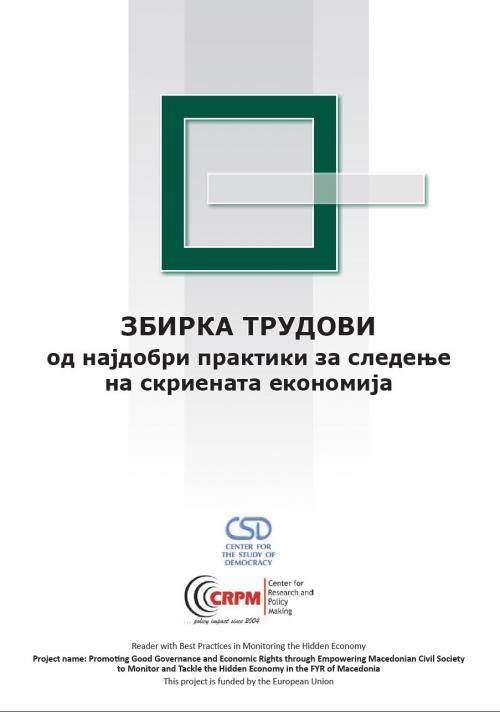
Recognizing the profound significance of the problem to countries in Southeast Europe, the Center for the Study of Democracy (CSD) in Bulgaria and the Center for Research and Policy Making (CRPM) in Macedonia have started an initiative to monitor and analyze the hidden economy and to outline actions for curbing its negative implications in Macedonia. CSD and CPRM seek to introduce evidence-based tools for monitoring and awareness raising for tackling the hidden economy in Macedonia, based on the experience CSD has acquired in monitoring and fighting the hidden economy in Bulgaria for more than 10 years. The purpose of the current review is to outline recent leading research and best international practices in monitoring the hidden economy. The compilation of articles summarizes the most recent activities in countering the hidden economy in the EU and beyond. Understanding current research and policy work on the hidden economy will help Macedonian government, practitioners, and civil society to better understand its nature and implications for development on national and local level in Macedonia. This introduction makes a brief review of the prevailing understating and definitions of the hidden economy, ways of measuring it, and concludes with a summary review of the articles included in the reader. The current reader aims to aid Macedonian policy-makers and other stakeholders to better understand, monitor, and tackle the hidden economy and its negative consequences on society and the economy, and in particular on the most vulnerable groups. It brings together the best recent academic knowledge on the hidden economy compiled and adapted to address the needs of the local constituency in Macedonia. The reader tries to serve as a helpful reference tool as well as a source of ideas and recommendations for action.
More...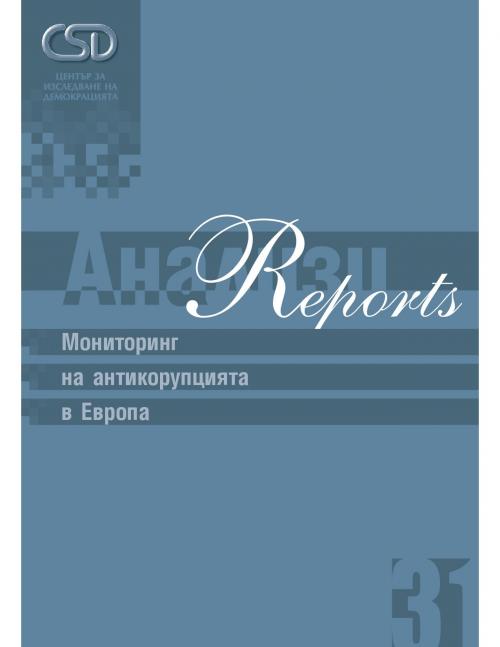
Corruption and measures to counteract it have been subject to so much research and political attention that it would seem that their every aspect must have been explored. Yet corruption proves bafflingly resilient, always finding new conduits for spreading; squeezed temporarily out of one public sector, it reappears in another. It could only benefit the anticorruption effort, therefore, if novel methods for analysis and prevention were found. It is in response to this need that the current report seeks to build bridges between the evaluation of anticorruption policies and the measurement of corruption. Monitoring Anticorruption Policy Implementation (MACPI) was born of the understanding that innovation in anticorruption is as important as it is in other social and economic fields. MACPI provides the anticorruption community with a precision-guided tool, which gives exhaustive feedback on the enforcement of policies.
More...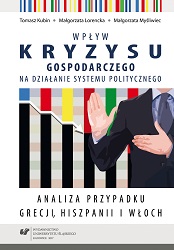
The main scientific goal of the following study is to show the impact of an economic crisis on the functioning of a political system. The object of detailed research studies was the political systems of Greece, Spain and Italy. It was in these European Union countries that the effects of the worldwide economic crisis seemed to have had the biggest influence on the workings of the constituent elements of the political system.The leading research hypothesis is that, under the conditions of representative democracy,the economic situation of a state is one of the major determinants of the stability and continuity of its political system. The better the economic condition of a state, the bigger its political system’s functional stability and ability to endure. On the other hand, under the conditions of a political crisis, this stability and continuity are seriously compromised.The analysis of the impact of the economic crisis on the functioning of political systems ledthe authors to the formulation of the following detailed hypotheses:The operations of political decision-making centres in Greece, Spain and Italy pertainingto economic issues — both on the central and local level — caused serious disruptions to thefunctioning of their political systems.1. The economic crisis in Greece, Spain and Italy caused considerable disruption to the rhythm of election cycles.2. The economic crisis in Greece, Spain and Italy affected the functioning of the party systems in these countries.3. The economic crisis in Spain and Italy considerably influenced an intensification of decentralizing tendencies in these countries.4. The economic crisis in Greece, Spain and Italy influenced an intensification of the process of formulating anti-system postulates by certain political groups.In the introduction, the subject related and methodological assumptions of the conductedresearch were put forward. Chapter one contains an analysis of problems related to the origins,course and consequences of the economic crisis of 2008. The next three chapters contain ananalysis of the consequences of this crisis for the functioning of the political systems of Greece, Spain and Italy. The closing chapter contains general conclusions resulting from the conducted research process.
More...
This publication investigates “Who is a normative foreign policy actor?” It forms part of a new project intended to explore fundamental aspects of foreign policy at the global level, against the backdrop of a proliferation of global actors in the 21st century, following half a century with only one undisputed global hegemon: the United States. The European Union is itself a new or emerging foreign policy actor, driven by self-declared normative principles. But Russia, China and India are also increasingly assertive actors on the global stage and similarly claim to be driven by a normative agenda. The fundamental question explored is how will these various global actors define their foreign policy priorities, and how they will interact, especially if their ideas of normative behaviour differ?
More...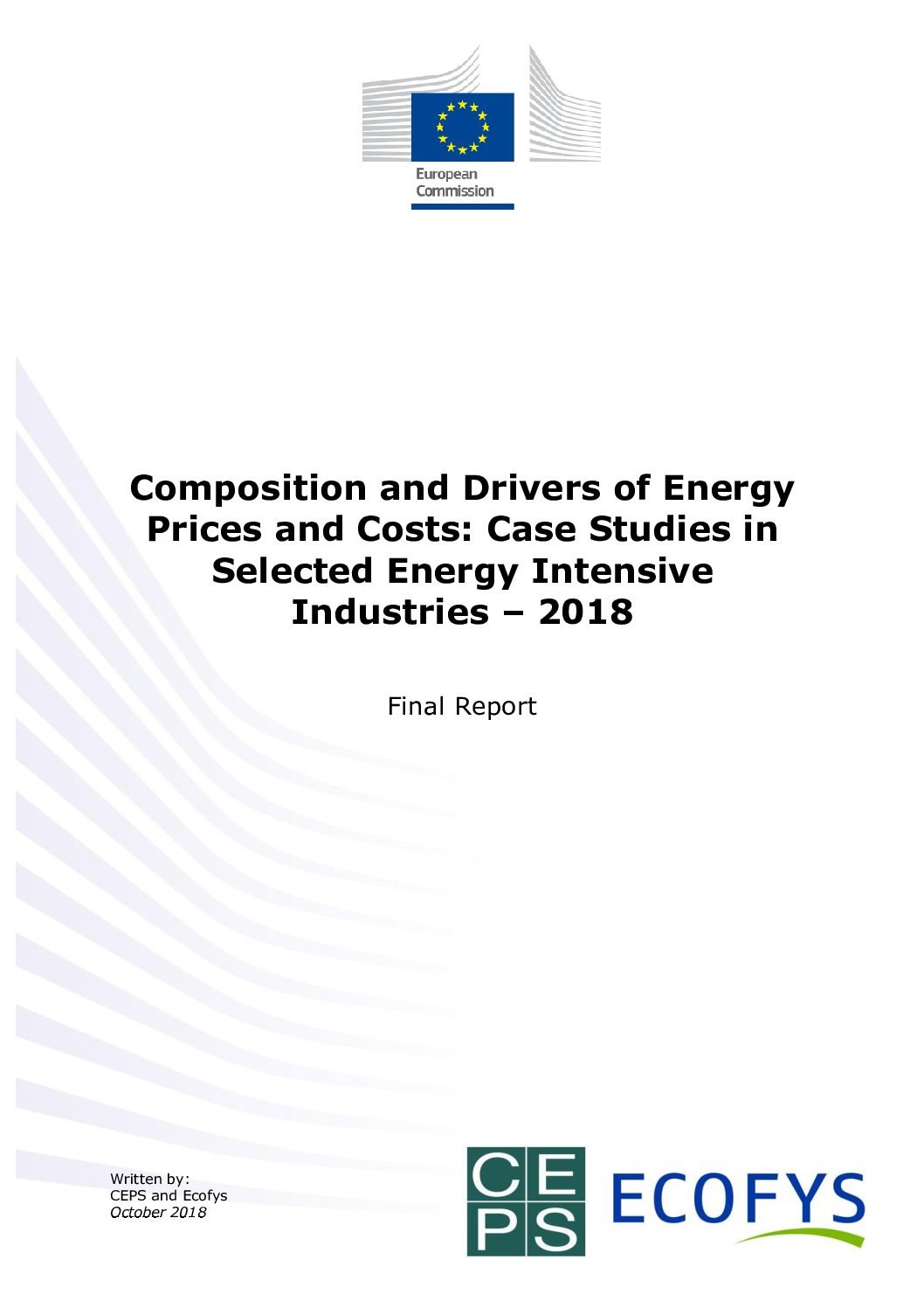
The current report represents the final deliverable of the 2018 edition of the “Composition and Drivers of Energy Prices and Costs: Case Studies in Selected Energy Intensive Industries” (hereinafter “the Assignment”). The Assignment aimed to achieve two main objectives: 1. Providing well-grounded, bottom-up evidence of the composition and drivers of energy prices and energy costs faced by industrial operators in EU energy intensive sectors.2. Assessing the impact of energy prices and costs and of their components on the cost competitiveness and, where possible, international competitiveness of EU energy intensive sectors.
More...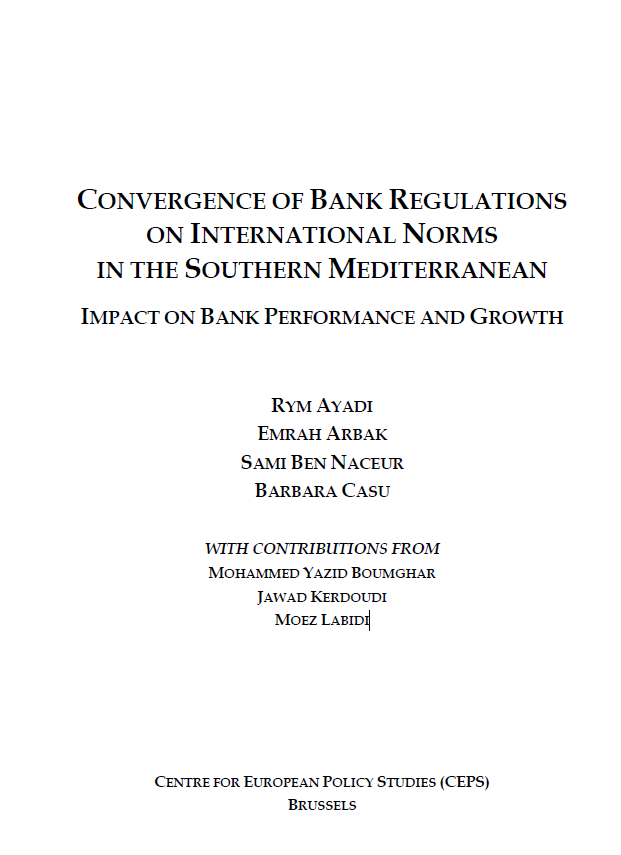
International standards and norms on banking regulations have, once again, leaped to the forefront of the policy discussion in developed nations due to the recent crisis in the world’s financial markets. This discussion is far from new, nor does it apply exclusively to the world’s most advanced economies. A sound and well-enforced regulatory regime can help developing nations to channel financial resources more efficiently into investments. For open economies, it can also act as a buffer, an important stability factor in today’s shaky market situation.
More...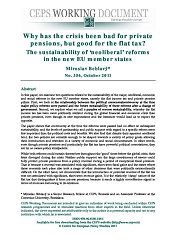
In this paper, we examine two questions related to the sustainability of the major, neoliberal, economic and social reforms in the new EU member states, namely the flat income tax and private pension pillars. First, we look at the relationship between the political consensus/controversy at the time major policy reforms were passed and the future sustainability of these reforms after a change of government. Second, we explore what we call a paradox of reverse sustainability, where by the flat income tax has been more politically resilient during the global financial and economic crisis than private pensions, even though ex ante expectations and the literature would lead us to expect the opposite. The paper shows that controversy at the time the reforms were passed had no effect on subsequent sustainability, and the levels of partisanship and public support with regard to a specific reform seemless important than the political costs and benefits. We also find that despite their apparent neoliberalbent, the two policies are versatile enough to be shaped towards a variety of policy goals, allowing their introduction and retention in a variety of economic and social circumstances. In other words, even though private pensions and particularly the flat tax have powerful political connotations, they are by no means policy strait jackets.
More...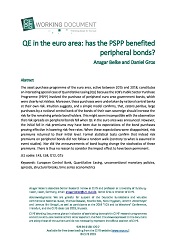
The asset purchase programme of the euro area, active between 2015 and 2018, constitutes an interesting special case of Quantitative Easing (QE) because the ECB’s Public Sector Purchase Programme (PSPP) involved the purchase of peripheral euro area government bonds, which were clearly not riskless. Moreover, these purchases were undertaken by national central banks at their own risk. Intuition suggests, and a simple model confirms, that, ceteris paribus, large purchases by a national central bank of the bonds of their own sovereign should increase the risk for the remaining private bond holders. This might seem incompatible with the observationthat risk spreads on peripheral bonds fell when QE in the euro area was announced. However, the initial fall in risk premiums may have been due to expectations of the bond purchases proving effective in lowering risk-free rates. When these expectations were disappointed, risk premiums returned to their initial level. Formal statistical tests confirm that indeed risk premiums on peripheral bonds did not follow a random walk (contrary to what is assumed inevent studies). Nor did the announcements of bond buying change the stochastics of these premiums. There is thus no reason to consider the impact effect to have been permanent.
More...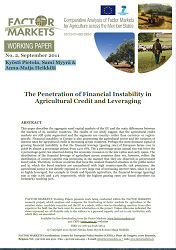
This paper describes the aggregate rural capital markets of the EU and the main differences between the markets of its member countries. The results of our study suggest that the agricultural credit markets are still quite segmented and the segments are country- rather than currency- or regionspecific. Financial instability in Europe is also penetrating the agricultural sector and the variation of interest rates for agricultural credit is increasing across countries. Perhaps the most dramatic signal of growing financial instability is that the financial leverage (gearing rate) of European farms rose in 2008 by almost 4 percentage points, from 14 to 18%. The 4 percentage-point annual rise was twice the 2 percentage-point rise observed during the economic recession in the late 1980s and early 1990s. The distribution of the financial leverage of agriculture across countries does not, however, reflect the distribution of country-specific risk premiums in the manner that they are observed in government bond yields. Therefore, in those countries that have the weakest financial situation in the public sector and in which the bond markets are encumbered with high country-specific risk premiums, the agricultural sector is not directly exposed to a very large risk of increasing interest rates, since it is not so highly leveraged. For example in Greek and Spanish agriculture, the financial leverage (gearing) rate is only 0.6% and 2.2% respectively, while the highest gearing rates are found elsewhere (in Denmark), reaching 50%.
More...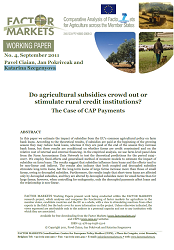
In this paper we estimate the impact of subsidies from the EU’s common agricultural policy on farm bank loans. According to the theoretical results, if subsidies are paid at the beginning of the growing season they may reduce bank loans, where as if they are paid at the end of the season they increase bank loans, but these results are conditional on whether farms are credit constrained and on the relative cost of internal and external financing. In the empirical analysis, we use farm-level panel data from the Farm Accountancy Data Network to test the theoretical predictions for the period 1995–2007. We employ fixed-effects and generalised method of moment models to estimate the impact of subsidies on farm loans. The results suggest that subsidies influence farm loans and the effects tend tobe non-linear and indirect. The results also indicate that both coupled and decoupled subsidies stimulate long-term loans, but the long-term loans of large farms increase more than those of small farms, owing to decoupled subsidies. Furthermore, the results imply that short-term loans are affected only by decoupled subsidies, and they are altered by decoupled subsidies more for small farms than for large farms; however, when controlling for endogeneity, only the decoupled payments affect loans and the relationship is non-linear.
More...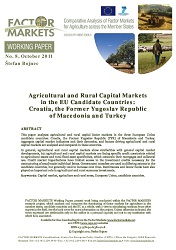
This paper analyses agricultural and rural capital factor markets in the three European Union candidate countries: Croatia, the Former Yugoslav Republic (FYR) of Macedonia and Turkey. Aggregate capital market indicators and their dynamics, and factors driving agricultural and rural capital markets are analysed and compared in these countries. In general, agricultural and rural capital markets show similarities with general capital market developments, but agricultural and rural capital markets are facing specific credit constraints related to agricultural assets and rural fixed asset specificities, which constrain their mortgages and collateral use. Credit market imperfections have limited access to the investment credits necessary for there structuring of small-scale individual farms. Government transfers are used to differing extents in the candidate countries, but generally tend to increase over time. Remittances and donor funds have also played an important role in agricultural and rural economy investments.
More...
The Kremlin Playbook in Europe analyzes the tools and methods used by Russia to exercise its influence on the continent. In particular, it shows how the Kremlin enjoys considerable surrogate power in some countries because of the oligarchization of their governance systems. It also highlights the effect of blinkered national policies which grant Russian capital access to European financial hubs. The report argues for a common transatlantic approach in the face of these threats. The report expands the map of Russia’s footprint built by previous Kremlin Playbooks, which examined Russia’s attempts to capture political and economic decision-making in sixteen European countries, by analyzing Greece and Cyprus. Their strategic location in the southeast of Europe and the eastern Mediterranean, common religious traditions, and historic ties make them an object of influence operations by the Kremlin.
More...
The weakening of the EU gravitational pull leaves a power vacuum in Southeast Europe that is readily filled in by authoritarian powers such as Russia. The Kremlin is taking advantage of the democratic backsliding and the widespread state capture among dysfunctional institutions to enhance its economic and political influence in the region. While Russian economic power in Southeast Europe has visibly declined since the imposition of EU and NATO sanctions on the Kremlin in 2014, its overall ability to influence domestic politics has remained potent and has even gained effectiveness. Russia has preserved its sway over strategic decision-making in the region most notably in the energy sector where it has locked governments in costly infrastructure projects. By exploiting governance deficits, the Russian economic footprint has expanded to include some of the biggest companies in the region in oil refining, wholesale fuel and natural gas distribution, telecommunications and retail. Their strategic importance for the national economies in Southeast Europe has provided Russia with an outsized political leverage. To amplify its influence, Russia has aptly employed a range of sharp power instruments such as media propaganda, leveraging cultural and religious ties and sponsoring of civil society activities. This report looks into the Kremlin playbook instruments in eight Southeast European countries: Albania, Bulgaria, Bosnia and Herzegovina, Croatia, Kosovo, Montenegro, North Macedonia and Serbia.
More...
Corruption continues to be one of the main social problems for Bulgaria a decade after the country’s EU accession. The Bulgarian public is one of the few in Europe, which trusts EU institutions more than its own government to find a sustainable solution to this problem. Making sure the mechanisms of EU conditionality and public procurement support deliver on these high expectations is of paramount importance for delivering a lasting solution to Bulgaria’s rule of law problems. As part of the largest ever team of social sciences and humanities in Europe – ANTICORRP.eu, CSD has developed two case studies, which help explain the key risks of corruption in the public procurement market in construction and the way the EU has impacted Bulgarian progress on anti-corruption.
More...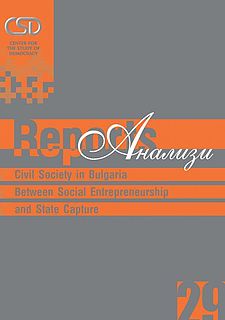
This publication analyses the changes in the third sector during the 2010 – 2013 period and at the same time outlines the positive practices in the social entrepreneurship as well as the risks that reduce the chances for nongovernmental organisations to effectively impact the democracy and well-being of Bulgaria.
More...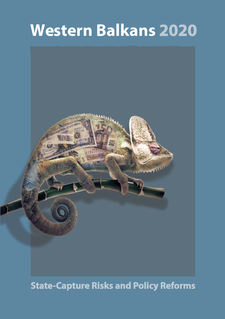
SELDI’s Regional Anti-corruption Report presents the civil society’s assessment of the regulatory and institutional factors enabling corruption in the Western Balkans region and emphasises some of the priority policy issues. SELDI’s monitoring tools provide data on the changes in the actual proliferation of two types of corruption – administrative corruption (bribery), which affects individuals and businesses, and state capture (grand corruption) affecting the functioning of democratic institutions and the government. With respect to the latter, SELDI’s State Capture Assessment Diagnostics (SCAD) tool reveals the presence of strong environmental enablers such as ineffective public organisations which lack integrity, impartiality and robust anti-corruption protocols. It also shows symptoms of business state-capture pressure, i.e. monopolisation happening at national, sectoral or institutional level. The energy is among the risk sectors, due to its high levels of concentration, inefficient corporate governance structures of state-owned enterprises and lack of adequate regulatory oversight. Furthermore, SELDI’s Corruption Monitoring System (CMS) shows that the acceptability of corruption remains relatively high in the region, while citizens do not trust the governments’ ability or willingness to tackle the problem. The public procurements are an area of particular concern. SELDI’s assessment highlights that tenders are often designed to favour specific bidders, there is a poor compliance oversight, overuse of negotiated procedures, and a large number of tenders with only one bidder. The judiciary also faces several deficiencies: overlap of competences, lack of resources, and influence of the legislative and executive branches in the selection and promotion of judges and prosecutors. The authors underline that releasing the governance from the state capture grip can only be achieved by an alliance of reform-minded policy makers, civil society and international partners. The EU in particular would need to be more active in its political engagement with the Western Balkans, providing them with a clear perspective for the future. Stronger engagement would, however, need to ensure that the benefits of closer economic integration with the Union do not accrue exclusively to a small clique of privileged oligarchs. The overall process should also neutralise the harmful effects of authoritarian influence in the region.
More...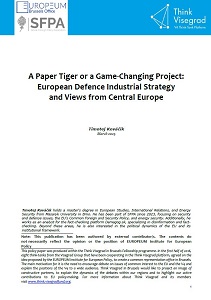
This paper deals with the topical issue of the first-ever European Defence Industrial Strategy (EDIS), which was introduced by the European Commission and the High Representative/Vice-President for Foreign Affairs and Security Policy (HR/VP) in March 2024. The strategy aims to increase European defence industrial readiness, encourage Member States to invest in the European defence industry, and reinforce joint European defence procurement and ownership. EU Member States from Central Europe have played a crucial role in supporting Ukraine after the start of the Russian unprovoked and illegal full-scale invasion in February 2022. They also stressed the need to focus the EU's efforts on new initiatives in the field of defence and the defence industry, such as the Act in Support of Ammunition Production or enhancing the European Defence Fund. The main objective of this study is to identify how Central European countries (Czech Republic, Hungary, Poland and Slovakia) and their representatives (state officials, Members of Parliament, Members of the European Parliament) perceive EDIS and what priorities they seek to pursue during the implementation of the strategy to use its full potential for their defence industries and cooperation among Member States. Furthermore, the paper discusses the preparatory phase of the strategy from the perspective of the Central European Member States and the European Commission. It also explains what Member States from Central Europe expect from the newly appointed Commissioner for Defence and Space. In order to obtain data, the author conducted interviews with relevant stakeholders such as politicians, academics, diplomats and experts from EU institutions and leading European think-tanks.
More...